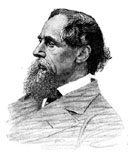
Charles Dickens’s ‘A Happy Holidays Song’
GUEST COLUMN
Dear Mr. Charles Dickens:
We are very interested in publishing an American edition of your new book, A Christmas Carol. We think it has great potential here, and even stands a chance of being selected by the Oprah Book Club, which is our equivalent of the Nobel Prize for literature.
There are, however, a few problems with your book that we would like to see resolved before making a firm commitment.
Let’s start with the title. A Christmas Carol has a certain nostalgic ring to it, but under the “Religion” section of our Sensitivity and Diversity Guidelines (being sent to you under separate cover), “Christmas” raises a red flag. Unfortunately, the name is associated with a specific religious figure in whom not everyone believes. We must consider the feelings of our Jewish, Muslim, Buddhist, Hindu, Sikh, and other readers, not to mention atheists and agnostics, and try not to give offense. You may not be aware that giving offense hurts sales, and we are sure you would not want that.
I’m afraid the word “Carol” also carries Christmas connotations, and therefore presents the same difficulty. But rest assured that the “A” part of your title seems to pose no problem.
In view of the above, we would ask that you come up with a more user-friendly title for your book. A Happy Holidays Song has strong support here.
You May Also Enjoy
Political correctness is nothing more than female touchiness writ large.
Today's librarians apparently believe the only way to get kids to read is to sucker them in with books about television characters, or worse.
Once the God-given sanctity of all innocent human life is rejected, the main psychological and ethical barriers are breached.

